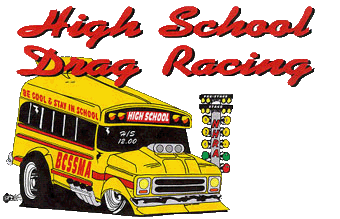The High School class is a recognized National Hot Rod Assocation (NHRA) and International Hot Rod Assocation (IHRA) Elapsed Time (ET) or Bracket Style drag racing class. In this class the handicap starting system allows a 1986 Chevette to compete against a 2008 Corvette or Mustang, with the Chevette having an equal chance of winning. It all boils down to driver skill.
High school races are held on NHRA and IHRA sanctioned tracks located in Mission, Prince George, and Ashcroft, with Division Six finals held at any NHRA and IHRA Division 6 tracks. Racing at non-NHRA and IHRA sanctioned tracks is not encouraged and is disallowed for BCSSMA member schools.
To be eligible, a student must be enrolled in a recognized secondary school program in a school district that has a drag racing policy in place. He or she must be 19 years of age or younger at the start of the racing season (March 1), have a valid drivers license with an “N” classification and have completed all the necessary district and track consent forms. For additional information, have your sponsor teacher contact the BCSSMA through this web site.
You will compete against other secondary school students.
Time trials, or practice runs, are run before elimination races begin each race day. Time trials allow novice drivers to practice their starting skills and calculate their “dial in time”.
Depending on the track, there will be a daily Driver entry fee and Spectator fee. Mission: Driver – $40, Crew – $5; Ashcroft: Driver – $25, Crew – $10. Pricing may be higher if tied to a National Open or Specialty event.
If your car does not pass the mandatory NHRA or IHRA Tech. Inspection, which takes place before every race, it is probably not safe to drive on any public road. However, the inspector looks for several specific things as well as general condition; these include the following: Steering, brakes, tires and lug nuts, seatbelts and the neutral safety switch. The vehicle’s cooling system must contain only water and there must be a coolant overflow container of not less than one litre/US quart. Also, the battery must be properly anchored to the vehicle. Bungie cords and snap-straps are not allowed for this purpose.
For most street cars, no modifications are necessary. Hubcaps and centre caps must be removed or bolted to the rim. All drivers must wear an approved helmet with a Snell rating of 2000 or newer.
With most street vehicles, anything that fails at the track was just about ready to break anyway. Properly racing a well maintained street vehicle will not place undue stress on it. Remember, it is driver skill and consistency that wins races, not speed and power.
High school cars may not run quicker than a 12.00 second ET (a stock Corvette ZR-1, Dodge Viper or 5L Mustang cannot achieve this in the quarter mile).
Yes, but it must meet BCSSMA rules and NHRA or IHRA specifications as per the rule book published every year. NHRA and IHRA Rule Books are available at many Auto Parts outlets and online.
Open exhaust, Slicks, Line lock, Turbocharger, Supercharger, Intake manifold, Cylinder heads, Pistons, Cam shaft: as you can see, you are limited more by your budget and the “12 second” rule than anything else.
Nitrous oxide, Transmission brake, Electronic starting aids and Multi-stage rev limiters are not allowed in high school class.
You may compete with someone else’s vehicle (car or light truck) provided you have the proper consent forms signed by the registered owner. Many schools have “school” cars for those students not having vehicles.
Yes, although the majority of cars are automatic, some with shift kits and hi-stall torque converters.
Any additional questions can be directed to the Technical Department at tech@highschooldragracing.ca

